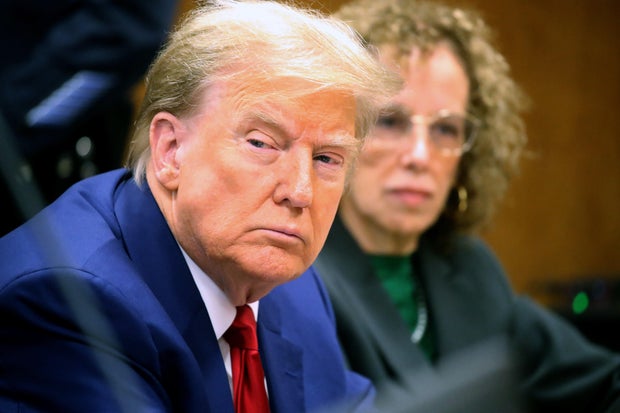The New York judge overseeing the criminal case against former President Donald Trump stemming from a “hush money” payment made to an adult film star rejected his bid to delay the trial over a new batch of documents, ruling after a hearing Monday that proceedings would get underway on April 15.
“[Prosecutors] went so far above and beyond what they were required to do that really it’s odd that we’re even here taking this time,” Judge Juan Merchan said at one point, as Trump looked on.
Merchan convened a hearing Monday to hear arguments from Manhattan District Attorney Alvin Bragg’s office and Trump’s legal team over the new dispute, which centers on roughly 100,000 documents that federal prosecutors handed over to the D.A.’s office earlier this month. Trump attended the hearing in a Manhattan courtroom, which fell on the same day that the trial was originally scheduled to get underway.
Earlier this month, Trump’s team protested the late production of the records, and Merchan set a new tentative trial date of April 15. Trump’s attorneys argued the proceedings should be delayed even further or outright dismissed, accusing Bragg’s office of “widespread misconduct” for failing to obtain and hand over the documents sooner. Prosecutors argued that they were under no obligation to obtain the records, which originated from the U.S. Attorney’s Office in New York, and said only a small number were relevant to the New York case.
Trump is charged with falsifying business records related to reimbursements for a $130,000 payment to adult film star Stormy Daniels in the days before the 2016 election. Daniels alleged she had an affair with Trump years earlier and agreed to sell the rights to her story in exchange for the payment, which was made by Michael Cohen, Trump’s former “fixer” and lawyer.
Trump has pleaded not guilty and denied having an affair with Daniels. He called the prosecution a “witch hunt” and a “hoax” as he entered the courtroom with a somber expression Monday morning.
Monday’s hearing
Trump’s defense asked for either a lengthier trial delay of up to three months or a dismissal of the case, alleging that Bragg’s office deliberately failed to obtain the documents. Prosecutors said they requested the records last year, and the Justice Department initially declined to produce them, only to reverse course in response to a defense subpoena and turn them over in early March.
The documents totaled more than 100,000 pages relating to, among other things, bank records and emails concerning the Justice Department’s own investigation into Cohen, who pleaded guilty to federal charges in 2018. He is now the key witness against Trump in the New York case.
Merchan began Monday’s hearing by running through a timeline of recent filings and arguments in the case before posing a series of questions aimed primarily at the defense’s claim that the district attorney had failed to adequately seek the records.
Merchan said the defense’s filings in the leadup to this hearing had gone “far afield” of his instructions. He then noted that the purpose of Monday’s hearing was to “determine who is responsible for the issues and what sanctions if any are required.” He noted that there were “not significant questions of fact to resolve.”
The judge added that the question is “how we characterize the nature and scope” of the state’s obligation to produce documents to the defense, a process known as pretrial discovery. The district attorney’s office argued that it was not obligated to produce the Justice Department documents and made a “good faith” effort to turn over more material to Trump’s team than was relevant to the case. Prosecutor Matthew Colangelo added that the number of relevant records is a relatively small share of the total — about 300 out of the 100,000.
Todd Blanche, an attorney for Trump, countered that “thousands and thousands” of records were potentially relevant, and that the defense needed more time to sort through them. He also revealed that federal prosecutors informed him late Sunday night that they intend to hand over more records related to Daniels, whose real name is Stephanie Clifford.
Merchan questioned Blanche about his accusation that the district attorney’s office deliberately failed to obtain material that it was required to hand over to the defense. He said the defense’s motion to dismiss the case cited a law that says prosecutors must produce material from any office under their purview. Merchan asked Blanche if there’s any case that shows the federal U.S. Attorney’s Office is under the local prosecutors’ auspices.
“That you don’t have a case to cite right now is really disconcerting, because all the allegations that the defense makes is incredibly serious, unbelievably serious,” Merchan said, his voice rising. “You are literally accusing the Manhattan D.A.’s office and the people assigned to this case of prosecutorial misconduct, and trying to make me complicit in it, and you don’t have a case to cite?”
After a brief break, Merchan returned to the courtroom and ruled that jury selection would begin on April 15.
“This court finds based upon the record before it … that the district attorney of New York County is not at fault for the late production of records from the U.S. Attorney’s Office,” he said.

